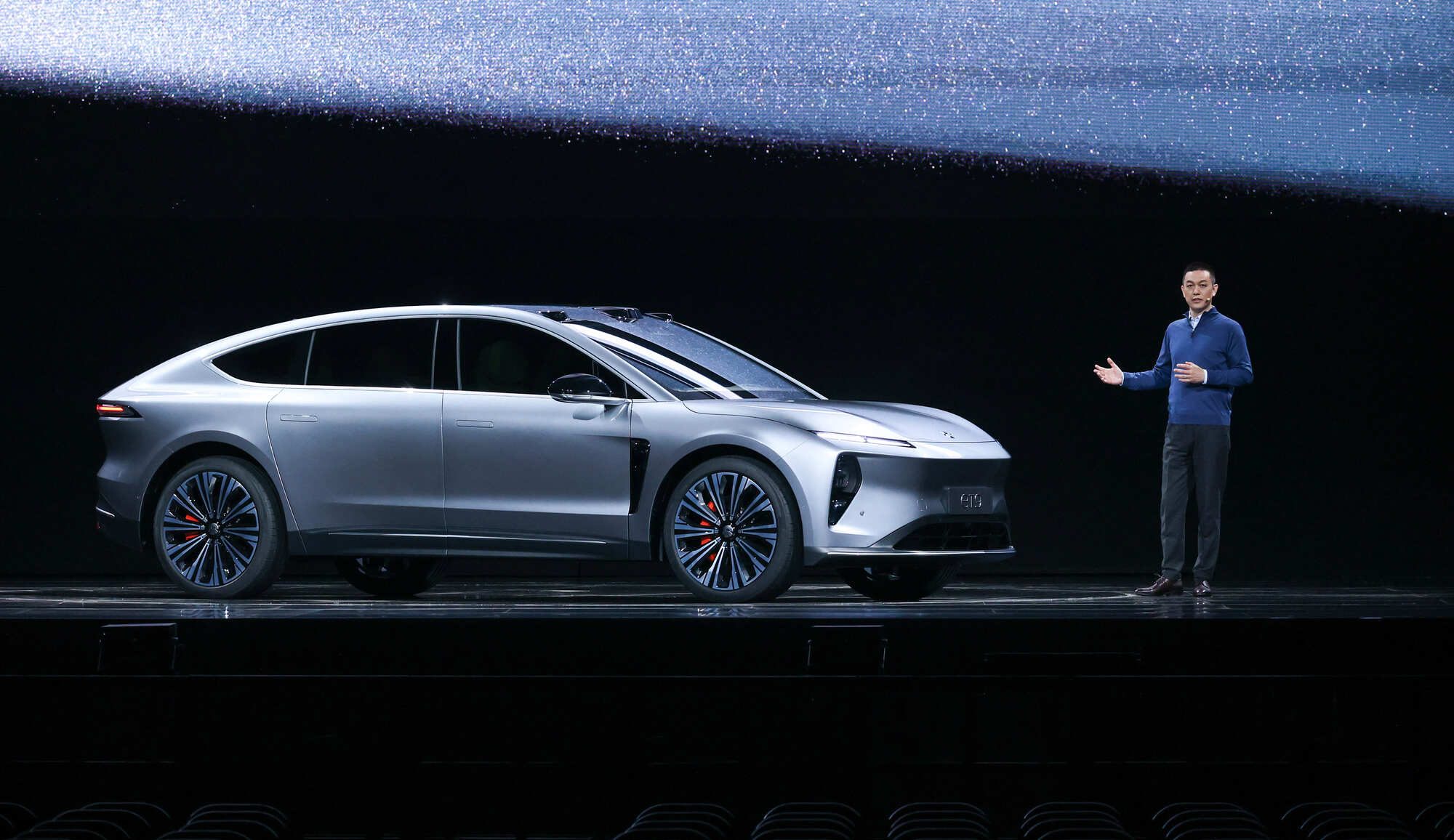Chinese EV maker NIO on Dec. 23 unveiled a long-wheelbase executive sedan model, the ET9, with a price range of $112,160. The model boasts its own self-driving chip, marking the first utilization of the five nanometer process technology in China’s auto industry.
The four-door executive flagship, equipped with proprietary technologies such as a sophisticated yet lightweight chassis system and a superfast-charging battery pack, reflects NIO’s commitment to redefining the upper premium vehicle market, William Li, the company’s founder, chairman, and chief executive, told press at the annual NIO Day event on Dec. 23. Li further referred to the target segment as ”a spiritual home base“ for international luxury carmakers (our translation).
With a pre-sale starting price of roughly RMB 800,000 ($112,160), NIO’s answer to the Porsche Panamera could serve as a low-volume halo car and is scheduled for delivery in the first quarter of 2025. Larger rivals from BYD to Geely have also launched similarly-priced offerings, indicating their aspirations to upscale and grab a slice of the luxury market.
Here are some of the key specifications of the ET9 presented by NIO at the company’s annual gathering held in the northwestern Chinese city of Xi’an.
Design highlights: Different from old-money cars that Western brands typically offer, the NIO ET9 features a sleek and contemporary look with high ground clearance, large 23-inch wheels, and cutting-edge gadgets such as laser sensors on the roof and sides for an all-round view of the car’s surroundings.
- The interior boasts a modern design language. The car features an almost two-meter (six-feet) console that extends through the length of the cabin and is integrated with equipment such as a 10L fridge and folding tables, offering passengers first-class-style seats and comfort.
- The grand tourer measures 5.3 meters in length and 1.6 meters in height with a wheelbase of nearly 3.3 meters, making it longer than the Bentley Flying Spur and almost as tall as a regular off-roader. The back seats can be reclined as much as 45° and come with full-body massage programs.
Autonomous driving: The ET9 will be powered by NIO’s first self-developed system on chip (SoC), the Shenji NX9031, for partially automated driving. NIO stated it will be the first Chinese automaker to use chips with five-nanometer process technology, providing its vehicles a computing power comparable to the combined total of that created by four industry-leading processors.
- By comparison, NIO’s existing lineups are equipped with four Nvidia DRIVE Orin chips that handle up to 1,016 TOPS on seven nanometers. The purpose-built chip is a strategic move as it could improve processing efficiency and machine learning algorithm coupling for autonomous driving, Jefferies analysts said on Monday.
- Li declined to provide further details about the semiconductor. Tesla has reportedly turned to Taiwan’s TSMC to produce its next-generation full self-driving (FSD) computer on 4/5 nm processes. Homegrown rivals Li Auto and Xpeng Motors are also developing their own chips for vehicle intelligence.
Large cylindrical battery: The ET9 will incorporate NIO’s in-house developed, 46105-type cylindrical lithium-ion battery cells. This implies a size of 46 millimeters in diameter and 105 mm in length with a cylindrical shape, a technology also embraced by Tesla in the hopes of increasing ranges and lowering costs.
- NIO asserts that its new batteries have a cell-level energy density of 292 watt-hours per kilogram (Wh/kg), and a 120 kWh pack can provide a range of 255 kilometers (159 miles) after five minutes of charging at a 5C rate, facilitated by a 900-volt electrical system. By comparison, CATL’s latest Qilin battery would allow Li Auto’s Mega van to cover 500 km on a 12-minute charge at a 5C rate.
- NIO did not reveal many further details, except for Li’s comments to investors during a Dec. 5 earnings call stating plans to outsource battery manufacturing for reduced investment and improved margins. The EV maker is reportedly in talks with Great Wall Motor-backed Svolt to set up a joint venture for making batteries in its car manufacturing base of Anhui.
Smart chassis: NIO also launched an intelligent chassis suspension system which the company claimed would provide a refined driving experience featuring a steer-by-wire system, rear-wheel steering, and adjustable suspension altogether for the first time in a mass-produced consumer car.
- NIO said the so-called SkyRide Intelligent Chassis System, in combination with hydraulic components, could be raised or lowered by 50 millimeters in one second to help passengers in and out of the car. In April, BYD introduced a similar offering that could automatically adjust to different road conditions and driving styles.
- In a 50-second video clip presented by NIO on Dec. 23, an ET9 prototype offered an apparently smooth ride when driving over multiple speed bumps and showcased a four-tier tower of Champagne glasses on the front body panel which remained in place despite the road surface. The flagship sedan is also highly maneuverable with a turning radius as low as 5.45 meters, a record also achieved by Xpeng with its upcoming X9 van.










